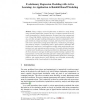Free Online Productivity Tools
i2Speak
i2Symbol
i2OCR
iTex2Img
iWeb2Print
iWeb2Shot
i2Type
iPdf2Split
iPdf2Merge
i2Bopomofo
i2Arabic
i2Style
i2Image
i2PDF
iLatex2Rtf
Sci2ools
139
click to vote
ICANNGA
2009
Springer
2009
Springer
Evolutionary Regression Modeling with Active Learning: An Application to Rainfall Runoff Modeling
Many complex, real world phenomena are difficult to study directly using controlled experiments. Instead, the use of computer simulations has become commonplace as a feasible alternative. However, due to the computational cost of these high fidelity simulations, the use of neural networks, kernel methods, and other surrogate modeling techniques has become indispensable. Surrogate models are compact and cheap to evaluate, and have proven very useful for tasks such as optimization, design space exploration, visualization, prototyping, and sensitivity analysis. Consequently, there is great interest in techniques that facilitate the construction of such regression models, while minimizing the computational cost and maximizing model accuracy. The model calibration problem in rainfall runoff modeling is an important problem from hydrology that can benefit from advances in surrogate modeling and machine learning in general. This paper presents a novel, fully automated approach to tackling ...
Algorithms | Computational Cost | ICANNGA 2009 | Surrogate Modeling | Surrogate Modeling Techniques |
Related Content
| Added | 26 May 2010 |
| Updated | 26 May 2010 |
| Type | Conference |
| Year | 2009 |
| Where | ICANNGA |
| Authors | Ivo Couckuyt, Dirk Gorissen, Hamed Rouhani, Eric Laermans, Tom Dhaene |
Comments (0)

